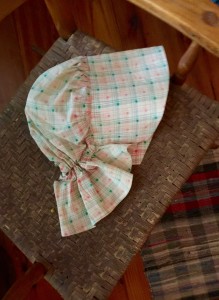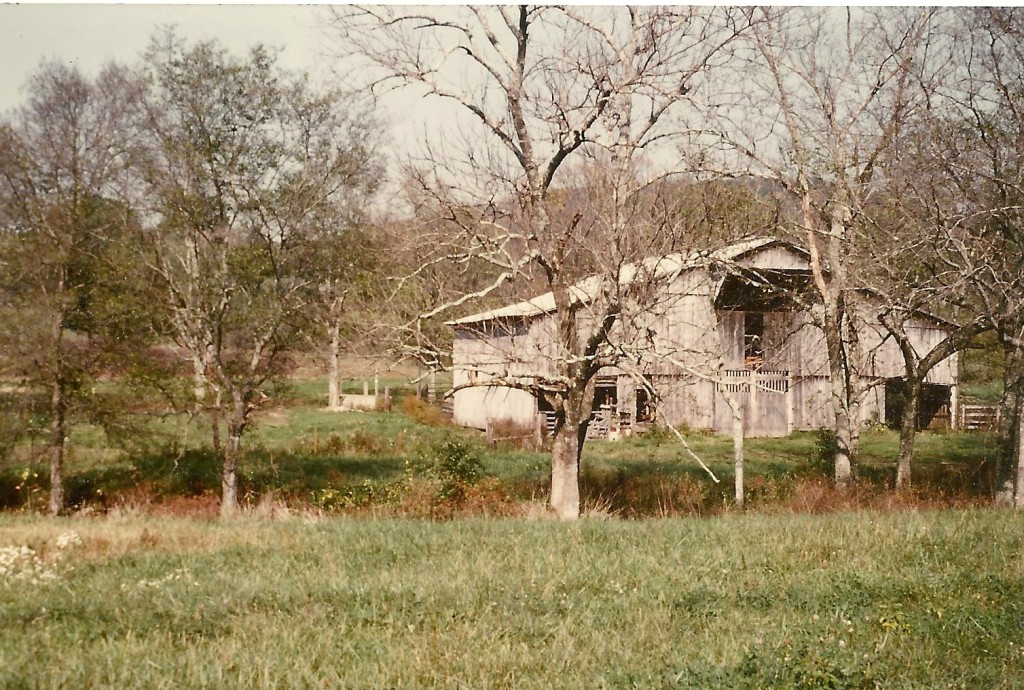“Watch out for the cow piles,” my grandmother said as we headed to the barn for milking. I skipped behind her, hopping over and around the cows’ contributions to the fertilization of the earth. Even a smidgen of one of these smelly deposits on my shoe would necessitate a thorough scrubbing to remove the odor.
Nannie stepped briskly in her black rubber boots, leaning forward with her bonneted head two feet in front of her body. Two wooden telephone poles, lying flat and butted up against one another , formed a bridge across the creek. A thick wire was attached to the trunk of a tree on each side of the creek to grab hold to as we walked across.
, formed a bridge across the creek. A thick wire was attached to the trunk of a tree on each side of the creek to grab hold to as we walked across.
Nannie made short work of walking the telephone poles, without using the wire, and continued the trek to the barn. I pulled up short, clinched my teeth, clutched the wiry life-line, lifted one red, dirt-stained sneaker, and stepped on one of the poles.
On the opposite bank, Nannie must have smelled my fear because she turned and coaxed me across in her low, comforting voice. “Don’t look down.”
I looked down. The crawdads were having a party in the water below, skimming and swirling along the silty bottom. Lazy leaves floated like tiny, green boats. It seemed miles lay between my feet and the life of the creek.
I sat down. Relief slowed my breathing. I sucked in air, exhaled, and began vigorously chewing the petrified piece of Juicy Fruit gum tucked in the back of my mouth.
Splinters posed a hazard to my palms and tender behind, yet I chose to scoot across. I pressed my palms and lifted my bottom, inching across until my fingers squeezed Nannie’s outstretched hand. I fell into the folds of her faded, calico work-dress, breathing in the fresh scent of washing powers. Together we walked to the musty barn where Granddad already had the cows attached to their milking machines.
My assignment was to stand sentry beside a large plastic bucket and shovel, its blade as wide as a toilet seat. Cows warned of impending bowel action by raising their tails. I watched. At the ready. Tails twitched. Lifted. Action! I moved with the shovel; the heft of it almost pulled my slight, eight-year-old body down. Granddad joined me. Leaning over, his hands gripped the handle above mine; we joined forces to catch the imminent splat.
The deadly odor of the thick, greenish-black ooze, coupled with the straw-dust tickling my nose, provoked a fit of spasmodic coughing and laughing. Delivered of her load, the cow mooed. I mooed back.
We maintained distance between excrement, barn floor, and milking machine. Teats—freed from the suction cups attached to them—dangled from udders, no longer swollen. I looked on as Nannie and Granddad poured the creamy milk from clean buckets into tall galvanized cans.
Granddad released the cows from their individual stalls and gave a holler to the line of bovine. They filed to the pasture to laze in the shade and chew on sweet-smelling grass.
***
Laundry was done once a week—more often during stifling Southern summers—after early morning chores. Soil, sour sweat, and animal smells wove into the fabric of garments, socks, bandanas, towels, and washcloths. Nannie’s washing machine was an old-fashioned vessel, large and round, situated in the center of her small, screened in back porch. I imagined it as a tub in which cartoon characters were riding the rapids.
Nannie fed sopping wet laundry through a wringer between two rollers that pressed out the water. With my bare feet planted on the smooth stone floor, I caught flattened pieces as they came through and tossed them in a basket. Nannie toted, I followed and watched as she pinned a parade of color to the clothesline.
***
Nannie ran a bath for me at bedtime. Splashing in the tub, I created an ocean of bubbles with a slippery bar of ZEST soap. Capturing it in my washcloth, I gave myself a vigorous scrub from head to toe, then grabbed the stopper’s shiny beaded pull and watched as dirty, brown water swirled down the drain, exiting with a loud gurgle.
Days lingered long those summers. Friday evenings, Granddad reclined in his easy chair and listened to the Grand Ole Opry on the radio, while rubbing his sore hands with Cornhusker’s Lotion. As strains of Bill Monroe’s fiddle drifted into my bedroom, I grew drowsy and snuggled under the sun-kissed sheets. Nannie’s moonflowers hugged clapboard along the side of the house. Blossoms opened large in the lunar light, offering their incense as a benediction to the day.
 Nannie and Granddad’s barn—worn by disuse and time— photographed in 1984 by my mother.
Nannie and Granddad’s barn—worn by disuse and time— photographed in 1984 by my mother.
Photo (above right)
Nannie’s Bonnet
Lisa, once again you’ve transported me to a place of peace! And as I lay here in bed, getting ready to start my day, I am encouraged to move through my activities of the day without grumbling, but with a sense of calm expectation and awareness, even thought chores are on the suburbs and not on the farm. Thank you!
Michelle, thank you for visiting YouAreHereStories again. You honor me. I like that my words transported you to a place of peace. May your days be filled with moments of deep calm and refreshment.
What beautiful, evocative details, Lisa, from the telephone-pole bridge to your mooing at the cows to the Cornhuskers Lotion. My mom always says her idea of true luxury is to have freshly line-dried sheets on the bed every night.
Dear Stacy, thank you for reading my story. My children did not experience life on a farm, so through writing, I hope to create a collection of stories for them to pass on to their children. (When I am called Nannie.)
I grew up on a farm, so I know many of these scents from my childhood. You take us there, through moments, through scenes, through vignettes. Through these stories, you honor your family and your past, and you bless us in our present.
Thank you, Ann. When I write about my childhood on my grandparents’ farm, the words take me away from the clatter and complexity of the world. I do, indeed, want to honor my past by sending my stories ahead to Nannie and Granddad’s descendants. We must never forget the smell of manure or the fragrance of a moonflower. 🙂
Lisa, your stories and writing style stand up to everything I’ve always loved about books like the Little House series, Charlotte’s Web, and so many others. Now we just need a podcast so we can hear you read these words in your lovely Southern accent! Thank you for taking us on this journey, and for showing us so much about Nannie along the way.
Oh, Kristin, thank you. I believe simple stories serve as a balm for today’s complex, harried world in which we live. Did you know that Laura Ingalls Wilder did not publish the first Little House book until she was 60 years old? And E.B. White wrote “Charlotte’s Web,” while at the same time writing those beautiful essays published as a collection. (One of my favorite books.)
Someday, I hope to publish the simple stories of the farm for my descendants.
Your comments encourage me.
What a wonderful, heart warming story. Your writing style gives the reader the feeling of being there with you.
Thank you, my dear, for your kind comments.
Oh, this is lovely. My present reality is Monday morning at my work desk in the concrete jungle of L.A., but through this piece, you transported me to a summer day in my home state, with great-grandparents I’ve never met but feel like I’ve met because of your wonderful stories. What a gift. Thank you.
Barbara, thank you. Simple stories about family are what I hope will be passed from generation to generation. Your great-grandparents would have adored you.